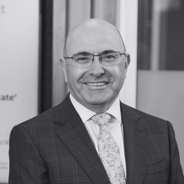|
In May 2024, the Queensland Futures Institute’s Queensland Finance Summit outlined the challenges and opportunities for the state’s financial services sector. This discussion highlighted the role of the sector in enabling growth opportunities across Queensland’s diverse economy by attracting investment and talent. The Summit also highlighted the clear role for the sector in facilitating the energy transition, as well as in supporting innovative business growth and natural capital markets in Queensland.

|

|
SPEAKERS
|
|
|
|
|

|
 |
 |

|
Leon Allen
Chief Executive Officer
Queensland Treasury
Corporation |
David Anderson
Chief Executive Officer
Australian Retirement Trust |
Kate Farrar
Chief Executive Officer
Brighter Super
|
Steve Johnston
Group Chief Executive Officer &
Managing Director
Suncorp Group
|
 |
 |

|
 |
Peter Lock
Chief Executive Officer
People First Bank |
Kylie Rampa
Chief Executive Officer
QIC
|
Dr Tony Warren
Group General Manager,
Communications &
Public Affairs
ANZ
|
MODERATOR -
Barry Trubridge
Partner and Financial
Services Leader
PwC Australia |
SUMMARY OF PANEL COMMENTS
- The sector will play a significant role in enabling growth across Queensland’s diverse economy,
especially in areas such as the energy transition, natural capital, and innovation. Financial services will
also play a significant role in supporting Queensland’s growth agenda and leverage its competitive and
comparative advantages.
- The recent changes around the financial services landscape, as exemplified by several
mergers highlights the role of scale in allowing for better customer service, talent retention,
and capital allocation.
- Queensland is an economic growth engine. This is driven by the size and diversity of our economy, the
fast-growing and entrepreneurial population, and comparative advantages in renewable energy and
critical minerals. There are also opportunities across many other sectors, such as the defence industry,
around the housing market, created by the Olympics.
- The main challenges faced by the sector relate to attracting and retaining talent, effectively
implementing technology, and overcoming burdensome regulation. There is a strong need to attract
and develop talent in Queensland, and to leverage the skills and capabilities of the local workforce.
- Technology will also play a critical role in enhancing efficiency, security and innovation in the sector.
- A current challenge being addressed is dealing with a high level of regulatory burden, highlighting the
need for better coordination among regulators.
- A key opportunity for the sector is the role of partnerships in advancing the sector and the state’s
economy. Collaboration between institutions, government agencies, startups and investors is critical to
creating value and opportunities for customers and members.
PANEL COMMENTS

|
Leon Allen
- QTC is focused on providing cost-effective financing and expert financial and advisory
services for Queensland government agencies, with the aim of becoming Australia’s
leading central financing authority.
- A key focus for QTC is not just what we do but how we engage with our investors, work
with banking partners and support our clients.
- In order to develop the financial services sector in Queensland it is also critical to focus
on engaging and working with our people to attract and develop talent and support
the industry
|

|
Kate Farrar
- Brighter Super was created by merging LGIA Super, Energy Super, and the former
Suncorp superannuation business. We have 230,000 members, 70% of whom are
in Queensland. About 85% of our funds under management, totalling $32 billion,
are owned by members living in Queensland. This makes Brighter Super the fourth
largest non-government financial institution in Queensland.
- The past five years have been quite a journey for us and for the financial services
sector in Queensland – while there are fewer financial institutions in Queensland now,
they are more substantial.
- In continuing this growth, talent retention is critical. While we typically see young
people leave, and return later in their careers, we need to retain people in Brisbane
throughout their careers.
|

|
David Anderson
- Australian Retirement Trust sees opportunities for financial services given
Queensland’s growth mindset and growth geography. This sets businesses and the
industry up for success.
- ART is among the top 25 retirement savings and income funds globally.
- To continue growing, we plan to further develop our talent and capability in
Queensland, and send talent to other parts of Australia and the world to increase
their impact.
|

|
Kylie Rampa
- QIC is a global alternative asset manager with $110 billion in funds under
management. We manage money for the Queensland Government and also large
private capital clients – which comprise 50% of capital.
- As a global business, we leverage our worldwide opportunities and expertise to
benefit Queensland, aligning our capabilities with the government’s agenda to enable
economic opportunities in the State.
- Key areas of investment include natural capital, biodiversity, infrastructure, and the
energy transition.
- Another area of investment is in private equity, through which QIC has supported
local startups, with 74 investments creating over 1,200 jobs. This enables companies
to grow locally, without needing to seek offshore capital.
|

|
Dr Tony Warren
- ANZ is awaiting approval for the purchase of Suncorp Bank. This is just one of many
opportunities in Queensland.
- Other megaprojects in Queensland include the Olympics, which will bring significant
infrastructure development. Another significant opportunity is the energy transition
– to which ANZ has allocated $35 billion of investment. Finally, there are major
opportunities in supporting the defence industry in Townsville.
- Queensland has a fast-growing, young, and entrepreneurial population – which
creates opportunities in lending around housing and small business growth.
- While the financial sector is a massive opportunity in Brisbane, another stand-out
industry is information technology. Queensland produces one-fifth of Australia’s IT
graduates but has only one-seventh of the IT jobs. It will be critical to retain this talent
locally and avoid the trend of graduates leaving and returning later in their careers.
- As part of the Suncorp Bank deal, we plan to establish a new 700-person IT hub in
Brisbane. This IT hub and the local talent pool represent exciting opportunities for
ANZ to build its presence in Queensland.
|

|
Peter Lock
- People First Bank is the new entity formed from the merger of Heritage Bank
and People’s Choice and is now 15 months old. This merger created the largest
customer-owned bank in the country, with $25 billion in assets, 2,000 employees, and
95 branches.
- Our branches span the Eastern seaboard and central Australia. We achieved scale in
financial services by merging a South Australian business and a Queensland
business, whilst maintaining dual head offices in Toowoomba and Adelaide.
- People First Bank is proud to keep our head office in regional Queensland,
highlighting the importance of financial services in the state.
- Scale is crucial in financial services, evidenced by mergers like Brighter Super and the
ANZ-Suncorp deal. Additionally, maintaining a strong presence in Queensland is
essential to ongoing success for the sector.
- Queensland should recognise the strength of the financial services sector – which can
be achieved by the Queensland Government appointing a financial services minister
to help the sector further develop.
|

|
Steve Johnston
- Suncorp has played a key role in the development of the financial services sector in
Queensland. The Group has connections with each of the businesses represented on
today’s panel, highlighting its role in the State.
- The transaction to sell Suncorp Bank to ANZ was announced more than 680 days ago
and pending all approvals being received, we expect completion of the deal around
the middle of the year.
|
Question: The spotlight is very much on Queensland this year, with a broadly favourable Federal
Budget and an upcoming election. What strengths and advantages do you see Queensland
carrying into the next 5-10 years?

|
Kylie Rampa
- The Queensland finance sector has grown at double the rate of the southern states
since Covid, highlighting its strong talent pool – which is critical for ongoing success.
- It’s important to leverage Queensland’s comparative advantages, working as a
finance industry to support areas such as agriculture, energy transition and
critical minerals.
- One of the key initiatives undertaken as a council has been to create a competitive
edge in sustainable finance. To do this, there is opportunity to strengthen our talent
capability – which is quite unique to our sector and aligns strongly with our economy
and areas of growth.
|

|
Leon Allen
- Queensland is a growth story with a large economy with fantastic
growth opportunities.
- At QTC, we are engaging with domestic and offshore investors who are buying both
benchmark and green bonds. We remind these investors that our economy has
been, continues to be, and will be a growth story.
- Our economy is as large as Portugal or New Zealand, with a value of around
$450 billion.
- While some people characterise us as a resource state, our globally competitive
resource sector only accounts for about 8.5% of our economic output – compared
to 27.5% in Western Australia. Our finance sector accounts for about 2.5% of
employment, which is the same amount as the resource sector.
- As such, we have the opportunity to further build scale in this diverse economy.
- It is critical to leverage our competitive and comparative advantages. For example,
the global energy transition is a materially significant economic theme, and it’s
playing out in large part in Queensland.
- Financial institutions are making allocations to energy transition, and we have a
great opportunity to apply our thinking, technology and scale to these opportunities.
- Our finance sector needs to be expert at attracting capital and allocating risk - and this
will be developed alongside the capability of our people to seize these opportunities.
|

|
Kate Farrar
- The growth story of Queensland creates many opportunities and is something
that Brighter Super supports - with 85% of our funds under management owned
by Queenslanders and 70% of our members being Queenslanders, we decided to
focus on Queensland.
- Queensland has fantastic growth prospects. Despite some concern about the
impact of the decarbonisation due to our history with fossil fuels and its status as a
resource state – we already benefit from a diverse economy and can benefit from
opportunities in critical minerals and clean energy
|
Question: How would you describe the comparative advantage of Queensland and how
this attracts business?

|
Peter Lock
- We managed to merge two organisations with very similar cultures, which has led to
a significant scale.
- The growth potential was also a key factor, especially considering the population
demographics in Queensland. Bankers are interested in where the population is
heading, and Queensland is attracting a lot of good quality people and potential
new customers.
- The strength of Queensland also lies in its large regional towns. While some might
see this as a disadvantage, it is actually a considerable opportunity to grow brands
and industries.
- However, a challenge for Queensland is the affordability and accessibility of
housing. This must be addressed so that we can continue to deliver opportunity
in Queensland.
|
Question: When you think about that future for Queensland, what do you think the role of financial
services is in helping with those transitions, attracting talent and realising opportunities?

|
Kate Farrar
- The financial services sector plays a critical role in efficiently allocating capital
to growth areas during any economic transformation. Queensland – which is
recognised as a growth engine across Australia – will therefore benefit greatly from
the sector in the coming years.
- Brighter Super is fortunate to be a mid-size fund, allowing it to look at a wide range
of asset sizes across the state. Some of Brighter Super’s assets include the Central
Queensland Livestock Exchange at Gracemere outside Rockhampton, as well as
part ownership of the Sunshine Coast airport. This is in addition to investments in
the energy transition, through assets like the Cooper’s Gap Wind Farm.
- Brighter Super has already invested a billion dollars in Queensland – but today’s
announcement of our new Queensland Asset Strategy will see a 50% increase in
allocation to Queensland, with the aim of delivering jobs and growth across the
state, while investing in assets that benefit members and provide great returns.
- The planning for this investment allocation is well underway, with portfolio managers
like QIC targeting growth areas such as agriculture, critical minerals, and the energy
transition. Over the next five years, Brighter Super will roll out investments in a
diverse range of interesting assets across the state. This strategy resonates with
members as it will see investment in assets that will power their future.
|

|
Steve Johnston
- The decision to divest the bank was predominantly driven by the emerging
challenges in the insurance sector.
- The transaction will allow us to invest significantly and focus exclusively on the
biggest challenges in Queensland, particularly insurance affordability and availability.
- Over the past hundred or more years, we’ve allowed construction in areas where it
should never have been permitted. The negative outcomes of this will be amplified
with climate change.
- As a nation, we face a big challenge in investing in public infrastructure to protect
our communities.
- We need to provide subsidies and certainty for people to make their homes
more resilient.
- There’s a rush to get housing into the market in Queensland, which could lead to
homes being built in unsuitable locations, repeating mistakes of the past hundred years
– so it is critical to address these issues before we make the same mistakes again.
- Governments are starting to address these issues, and advocacy is having an effect
with hundreds of millions of dollars being pushed into mitigation and resilience
initiatives. However, billions of dollars will be necessary to protect our people over
the next 20 years.
- There is a clear opportunity to address this in Queensland as it is the state most
exposed to these challenges.
|

|
David Anderson
- Queensland’s increasing population size and net migration are key drivers for the
growth of the State.
- There are also opportunities to deploy capital towards infrastructure necessary to
cope with an ever-increasing population, particularly as we approach the Olympic
Games for 2032.
- This will create downstream benefits to services and businesses – particularly in
service industries.
- All of this requires the right policy settings, the right availability of capital and the
right expertise to ensure these things are executed well.
|

|
Kylie Rampa
- The Queensland market landscape has changed substantially in recent years.
- The merger of QSuper and Sunsuper to create ART has created the second largest
superannuation fund in the country. The merger of Energy and LGIAsuper to form
Brighter Super has also significantly strengthened the presence of Queensland
funds in the domestic superannuation market.
- We have also seen QIC as a key player in the local financial services ecosystem
and it’s also great to see national players like ANZ now increasing their focus,
contributing to the evolving landscape.
- These changes are creating a much deeper capability and power of capital in
the market.
|

|
Barry Trubridge
- The importance of scale has been a recurring theme in the discussion. Scale not only
allows better customer service but also builds confidence to further invest within the
state – for example, to deliver education and training which positions businesses to
take advantage of the prospects over the next five to ten years.
|

|
David Anderson
- Competitors and competing ideas create opportunities for continuous improvement.
- We need to remember that there are multiple destinations for every dollar of capital
that can be deployed. There are also multiple options for talent to consider where they
want to work and live. Additionally, customers and consumers have multiple choices
about who they want to do business with.
- Competition should be seen as a positive force that keeps us sharp in terms of the
propositions we put before our clients and customers. This applies to where we
source talent from and the investment destinations for capital.
|
Question: Businesses are facing many challenges - there’s a cost-of-living crisis and a war for talent.
How are you responding to these challenges within your own organisations? What sort of mindset
are you taking to them? What sort of initiatives are you looking to kickstart within the Queensland
market?

|
David Anderson
- ART is two years old but carries a 140-year history.
- We’ve spent the last two years focusing internally on integrating a large merger.
We are considering what it means to be world-class, particularly in the areas of
investments, employee benefits, retirement savings, and income outcomes – and we
aim to bring a world-class perspective as well as a local peer
relative perspective.
- We are trying to turn this thinking into action, to execute value for our customers or
members – this is critical in addressing these challenges.
|

|
Dr Tony Warren
- The importance of scale has been a recurring theme in our discussions.
Technology is a crucial aspect of this - as every company is now effectively a
technology company.
- Scams are a significant problem, leading to a technological arms race to keep
customers’ money safe, requiring a huge expenditure. This is one of the reasons for
the Suncorp acquisition - to defray these costs over a greater number of customers.
- The cost of living is another issue that customers frequently mention. We have
recently experienced the largest increase in interest rates over the shortest period of
time in living memory.
- Despite this, the ‘90 days plus overdue’ metric in our book is still substantially below
pre-Covid levels, suggesting most people with a mortgage are in a relatively decent
financial position.
- But those on the rental treadmill are feeling the pain. The average amount of income
spent on rent has increased from below 30% to 32% in Brisbane and 36% in regional
Australia.
- These are substantial challenges in response to which the financial industry has a
role to play
|

|
Peter Lock
- Our customers and our book are in good shape, despite the rapid rate increases.
- However, there is pressure on savings as people are ahead of their mortgages, and
this trend is gradually decreasing. As such, people may soon be under pressure.
Another key metric here is employment.
- When trying to alleviate stresses, there’s not much we can do about the cost
of living due to business constraints. However, businesses can make their own
services as easy as possible for their customers.
- We do this through a ‘member assurance check’ or ‘MAC moment’, how our
business can make things easier - not harder - for our members.
|

|
Steve Johnston
- Without any context about what’s happening in Australia, the data does not clearly
show anything amiss in the economy. However, we know there’s a lot of pressure,
particularly on the insurance side.
- Normally, insurance accounts for about 1% of the CPI basket, but it’s now
contributing about 8%.
- Inflation in insurance is different from CPI inflation because global reinsurers, who
used to put their capital into Australia for diversification benefits, have realised that
Australia is quite a risky place to put their capital.
- As an insurance company, we need to modernise our products. We’re still writing
traditional home and motor products that are 20 years old on systems that are 40
years old. This modernisation will enable us to reflect more accurate data, enabling
lower premiums and more personalised products.
|

|
Kylie Rampa
- Talent is a significant issue, and companies are only as good as the talent
they have.
- It’s critical for Queensland to continue attracting high-calibre talent in a competitive
global market.
- Post-covid, there are no longer state barriers for talent, so we must compete
effectively with the southern states.
- When we attract people, remuneration is a major consideration, but we also need to
provide ongoing opportunities and career progression.
- We need to work closely with universities to tap into the graduate talent pool.
- Talent will continue to be an ongoing issue, and all companies must focus on
attracting the brightest and best.
|

|
Leon Allen
- We need to focus on creating linkages with our educational institutions and think differently about how we engage with graduates.
- At QTC, we see both a local responsibility and opportunity to support those graduating from Queensland institutions – as the calibre of finance programs and the quality of graduates in Queensland are excellent.
- We aim to create a strong connection to Queensland in these graduates, even if they seek
further career development outside our borders.
- There are many opportunities in the finance industry to support various streams of growth, with a focus on decarbonisation and sustainability.
- We acknowledge our resource and carbon heritage, but also highlight the investment going into other parts of the economy to strengthen economic infrastructure, social infrastructure and decarbonisation.
- As a result of this investment, QTC runs the largest green bond program in Australia – with
about $12.75 billion of issuance. Currently only 1% of this asset base is linked to supporting
renewable energy, so that will grow as this is about $19 billion worth of renewable investment going into the energy transition in the current forward estimates of the state budget.
- The opportunity lies in how we leverage this investment to attract capital and work on the
allocation of risk.
- We’re aware of the pressures across the economy, but there is a great opportunity to help
governments fund the transition through the efficient allocation of capital.
|

|
Kate Farrar
- The twin ideas of technology and talent are critical, with Queensland having a young and
entrepreneurial workforce. The aspirations of the younger generation to run their own
businesses at a young age is a fantastic opportunity for the finance sector in Brisbane.
- While scale is often emphasised, there are many fantastic smaller businesses and startups - particularly in the tech space - given this trend in Queensland.
- Building a supportive ecosystem between startups, growth businesses and larger businesses could help take advantage of these opportunities. For example, through technology and availability of software as a service, it’s now possible to get well-priced, good quality software through subscriptions, which was not possible for small-scale businesses previously.
- There is clearly a large opportunity in partnering with younger, more innovative businesses in Brisbane.
|
Question: Partnerships, access and technology has rendered scale less critical for business success.
How does this impact the whole financial system?

|
Peter Lock
- While regulation is necessary, its sensibility can be questioned in the current environment.
There is a significant lack of coordination between regulators, leading to an overwhelming
volume of requests for information and investigations. Additionally, it disproportionately impacts the customer owned sector versus the listed companies.
- We’ve been advocating for a regulatory grid where regulators are better coordinated – which has now gained traction.
- While this will change the way regulators operate, it is critical for regulated businesses given regulatory burden on businesses.
- New liquidity rules proposed by APRA could be counterproductive to competition and lead to the disappearance of smaller mutual banks. This would be contrary to facilitating
competitive dynamism.
- The impacts of this burdensome regulation is impacting accessibility to finance for customers – and is therefore critical to address.
|

|
Steve Johnston
- There’s a significant burden of reporting requirements being placed on our supply chains and suppliers, including through cyber resilience, climate reporting, human rights statements and modern slavery statements.
- While these measures are directionally correct, they can be burdensome for
smaller businesses.
- There’s a concern that these requirements could lead to the shortening of supply chains and concentration among a few larger players.
- This is because it’s easier to get certification from these larger players, many of whom may not be in Queensland or even in Australia.
- The practical application of these governance and disclosure processes therefore must be
carefully managed.
|

|
Dr Tony Warren
- The analogy used is that implementing a five kilometre per hour speed limit on all roads would make it the safest road network, but at a huge cost.
- Applying this to the finance industry, there is a balance between risk allocation and pace.
- Regulation must consider the ultimate goal to provide quality service to startups, businesses and first home buyers without overcompensating or becoming too risky.
- This can stimulate the economy if the right balance is struck, but if not, we risk becoming overly burdened and slow.
- This challenge is not just being driven by regulators - but also a broader culture of conservatism around risk. However, it is critical to strike the balance between reducing risk without stifling business activity.
|

|
Kylie Rampa
- Partnerships are critical to solving this challenge. Exemplifying this – a recent partnership
between ART, the State Government, Brisbane Housing Corporation, and QIC led to the
creation of Australia’s first funding model for social housing, aiming to deliver over a thousand social homes in Queensland.
- Brighter Super has also been working in partnership to unlock opportunities in the state, with interest in infrastructure, the critical minerals sector and natural capital.
- Additionally, we are supporting startups and Queensland enterprises through partnerships with the government, the Business Development Fund, the Enterprise Acceleration Fund and by attracting venture capital players.
- These partnerships aim to deliver on many initiatives for the state and will be critical
going forward.
|

|
Kate Farrar
- Developing the Queensland finance sector is critical to engage large suppliers to assist with reporting and ensure they invest in Queensland.
- Brighter Super recently appointed State Street as their custodian, in addition to ART also
developing this partnership. This has led to State Street’s investment in the Queensland
finance industry.
- This highlights how working together and forming partnerships with other firms creates an exciting and robust industry.
|

|
David Anderson
- Growth, competitive differentiation and success are key outcomes of effective partnerships.
- We live in a rapidly changing world which is becoming more fragmented and is moving faster than ever before. It’s unrealistic to expect that a business will have all the necessary capabilities within its own structure.
- To remain competitive and relevant, partnerships are critical for modern business success in this hyper-competitive marketplace.
|

|
Leon Allen
- We rely on a dedicated group of finance institutions as our banking group to intermediate on our behalf with our investor base and we adopt a client-centric mindset in dealing with our banking partnerships.
- It is critical for the finance sector to treat partners with a client mindset as we take advantage of opportunities for financial services in Queensland.
|
AUDIENCE QUESTIONS
Question: Considering the significant losses to scams reported by the ACCC and the susceptibility of older and rural Queensland residents, what additional measures could we implement to educate them about these risks and enhance their protection against financial scams?

|
Peter Lock
- Education is the first and foremost solution to the problem, and financial institutions need to set up vulnerable customer teams to address this issue. However, there will always be difficulties to support victims of scams.
- As ADIs, we have an obligation to abide by AUSTRAC rules in terms of suspicious transactions.
- This is a national problem and is likely to get worse as more people become digitally vulnerable.
|

|
Dr Tony Warren
- There is a significant need to combat financial crime. However, there are limits to how much we can help.
- The role of financial institutions is to ensure that our apps are as safe as they can be, however, there is a broader role outside of banking to develop an ecosystem solution to this problem. This involves getting telcos, social media and big platforms involved.
- While these corporations and institutions play a role, education is key to addressing this issue.
- Given the reliance of scams on cryptocurrency, Australia has benefited from restricting the use of these digital currencies, despite restricting legitimate consumer use.
|

|
Steve Johnston
- I believe that despite concerns about digitisation and AI destroying jobs, the world always
manages to adapt.
- As a banking industry, we’ve spent hundreds of millions of dollars creating frictionless banking, allowing everyone to transfer money around the system instantly. However, scammers have exploited this system, often moving the money to crypto before we can even react.
- To address this, we may need to reintroduce some friction into the process - even though it’s not a customer-friendly approach - in order to prevent scams from happening so quickly.
|

|
Peter Lock
- I believe that the problem can be fixed with friction, but also by having more people to
address fraud.
- The anti-scam accord will go a long way toward addressing this issue.
- For our business, we may invest in personnel to address this problem until we can develop a robust AI solution. Technology – including AI and biometrics will play a significant role in this.
|

|
Kate Farrar
- The response of banks to this has set the pathway for the response from superannuation,
which tends to have fewer, lumpier transactions.
- Initially, the super system was rated as quite low risk in terms of Anti-Money Laundering (AML) and fraud, but this has recently increased.
- Reintroducing friction is the only way to stop scams, but it’s a delicate balance to navigate.
Our members don’t want friction; they want to be able to access their super as soon as
possible.
- There’s a significant challenge in finding the right balance between protecting people’s money and not making the process too difficult to deal with.
|
Question: What is one bold change to the state tax base that would boost the Queensland economy
and make it future-ready?

|
Kylie Rampa
- Reforming taxes that are holding back the development of build-to-rent accommodation would make a marked difference in the housing crisis.
|
|
Question: What do we need to put in place to make an effective natural capital marketplace in Queensland?
|

|
Kylie Rampa
- Queensland has a significant natural capital marketplace and biodiversity capability, which will be critical to support Australia in achieving net zero targets.
- Natural capital is a key opportunity. As the market develops, we will see greater rigour around how carbon is priced and traded.
- New methodologies are emerging in the marketplace which will drive the various benefits that are unlocked by natural capital markets.
|

|
Leon Allen
- We need to develop the technology and methodologies to unlock natural capital investment. This involves developing rigour and precision in the development of the marketplace, creating genuine and tradable natural capital assets.
- To do this, we need to think about the whole supply chain and create people with the technology and understanding to support it.
- For example, QTC’s green bonds use a Danish third-party to verify our asset base before
we put it into our green bond pool. They also provide independent assessment of some of
our reporting.
- This role is critical as these markets are developed in Queensland and Australia.
- We have an opportunity to grow similar capacity here in Queensland
|

|
Kate Farrar
- The response of banks to this has set the pathway for the response from superannuation,
which tends to have fewer, lumpier transactions.
- Initially, the super system was rated as quite low risk in terms of Anti-Money Laundering (AML) and fraud, but this has recently increased.
- Reintroducing friction is the only way to stop scams, but it’s a delicate balance to navigate.
Our members don’t want friction; they want to be able to access their super as soon as
possible.
- There’s a significant challenge in finding the right balance between protecting people’s money and not making the process too difficult to deal with.
|
Question: Considering our current investments and Queensland’s potential in renewable energy, how can we ensure that our actions today lead to exponential growth for the next phase of investment in the energy transition? What financial mechanisms and innovative strategies can we leverage to make Queensland the hub for this transition?

|
Kylie Rampa
- The building blocks are starting to form, particularly with the Queensland Energy and Jobs Plan and government investment supporting the necessary infrastructure.
- There are substantial opportunities for private capital investment in energy transition, which will coincide with infrastructure development. Queensland has a natural advantage in energy, which will be critical to this development.
- This development also resonates with offshore investors and is attracting interest
to Queensland.
- Innovation is another critical aspect – and there is a large role for startups and technology
development in this area.
|

|
Leon Allen
- We need to focus on the least cost transition and undertaking this development in a socially sympathetic and responsible way.
- It is critical to ensure support from communities and find a balance between delivering the infrastructure and development whilst creating opportunities for economic and regional development.
|

|
Kate Farrar
- From conversations at the LGIQ Civic Leaders Forum, it’s clear that every layer of government, every company and every individual is thinking about how we can navigate these challenges and leverage this significant opportunity.
- The Queensland Energy and Jobs Plan is critical – providing a unique approach to other states in ensuring benefits across the state. Because of this, we are turning our disadvantage - in being an emissions-intensive economy - into an advantage.
|

|
Dr Tony Warren
- Queensland’s skill development is critical in this context. We can leverage the significant
skillsets and technology capabilities from the mining and minerals sector to support the
transition, particularly given the comparative advantage that specialised Queensland
businesses have in this space.
- Financing and supporting these firms to transition is a significant opportunity for the finance sector to contribute in this space
|

|
Steve Johnston
- From a private sector perspective, any energy transition needs to be led by the government, and the preconditions for that transition have to be defined by the government.
- But the sustainability of the transition throughout history is underpinned by two things:
the availability of credit and insurance.
- These two elements will sustain the transition well beyond the government setting up the
preconditions for the transition to occur, highlighting the opportunity for the financial services industry throughout the transition.
|


























































